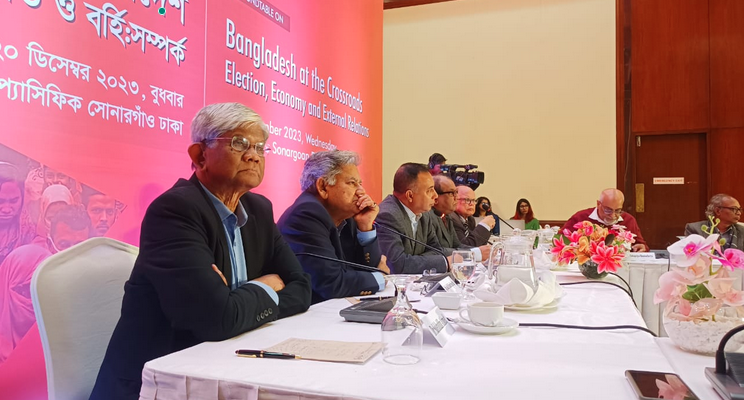
On the forthcoming 12th National Assembly elections scheduled for January 7, various comments have been made by former election commissioners, economists, and human rights activists. Their remarks include statements such as 'This is not a democracy,' 'This is not an election,' 'Elections have already been orchestrated by distributing seats between the ruling party and the alliance,' 'It's a farce,' and 'It's descending into chaos.' Additionally, they suggested that 'this election should be postponed.'
The speakers participated in a round table discussion titled 'Bangladesh in Crisis: Elections, Economy, and External Relations' held at the Pan Pacific Sonargaon Hotel in the capital on December 20. The Chairman of the private research organisation, Center for Governance Studies (CGS), Manjur Ahmed Chowdhury, presided over the event, and the executive director, Zillur Rahman, conducted the event.
Former Council of Ministers Secretary Ali Imam Majumdar, former Election Commissioner Brigadier General (Retired) Dr M Sakhawat Hossain, Security Analyst Air Commander (Retired) Ishfaq Elahi Chowdhury, former Foreign Secretary Md. Touhid Hossain, Sujan editor Dr Badiul Alam Majumdar, former Chairman of the National Board of Revenue Muhammad Abdul Majid, former governor of Bangladesh Bank Salehuddin Ahmed, Executive Director of Policy Research Institute of Bangladesh Ahsan H. Mansoor, Center for Policy Dialogue (CPD) Special Fellow Dr Debapriya Bhattacharya, Chairman of the Development Studies Department at Dhaka University Rashed Al Mahmud Titumir, Executive Director of Law and Arbitration Center (ASC) Farooq Faisal, Bangladesh Supreme Court Senior Advocate Z. I. Khan Panna, and New Age editor Nurul Kabir were in attendance at the event.
The roundtable discussion addressed the forthcoming national elections, the current economic situation in Bangladesh, and the potential impact of the polls on the country's economy and its relationships with the outside world.
Former Election Commissioner Brigadier General (Retired) Dr M Sakhawat Hossain stated, 'The ruling party essentially predetermined the election by distributing seats among opposition parties and alliances, nullifying the essence of a genuine electoral process. The issue lies in defining what constitutes an election. Many interpret an inclusive election as mere voter participation; however, truly inclusive elections are competitive and contested, where incumbents face challenges from other participants. Presently, there is no such challenge, rendering the outcome predetermined. Even after seat allocations, it's certain that the ruling party will secure 240-260 seats. If elections proceed in this manner, violence will likely escalate. There are already threats of serious physical harm and violence. The projected voter turnout for this election is not believable; we observed less than a 5% voter participation, despite past Election Commission reports indicating 17% turnout.'
Former Foreign Secretary Touhid Hossain addressed the issue of foreign interference in the election, stating, 'Currently, the West is commenting on election interference. Both Western and neighbouring countries have meddled in Bangladesh's elections. Before the 2014 elections, foreign ministers from neighbouring countries directly intervened. Democracy and elections lack accountability in our country. Major projects incur significantly higher costs than neighbouring states, with no explanation or accountability for the escalated expenses. While our foreign policy aims for friendship with all, our language doesn't foster positive relations with the West.'
Economist Dr Debapriya Bhattacharya expressed, 'I would describe it as a specialised election campaign rather than an election. Achieving political stability requires a political settlement. Previously, during similar crises, we reached political agreements, and this time, too, we need a new political consensus; otherwise, the country faces significant peril. As we transition from a lower-middle-income country to an upper-middle-income status, stable institutions and a balanced economic distribution are imperative. However, the absence of any cohesive organisation impedes our progress. Yet, I remain optimistic. I hope to trust the politicians to forge a new political compromise.'
In the discussion, the economist and the director of the Policy Research Institute, Ahsan H. Mansoor, raised concerns about the country's GDP and economic indicators. He stated, 'We have surpassed India in various indicators, with the GDP reaching 7.5%. However, the source of this GDP growth remains unclear. While narratives can be constructed by bolstering the GDP or various indicators, the fundamental situation doesn't improve; instead, the plight of the people worsens. Our financial sector cannot support the government, leading to potential challenges after making policy decisions. This situation could be detrimental for the government.'
Sujan Secretary Badiul Alam Majumdar demanded the postponement of the elections. Similarly, Supreme Court lawyer ZI Khan Panna raised questions about the country's democracy, stating that there is no fair election in an independent nation, indicating it lacks democratic principles.
The president of the discussion, Manzoor Ahmed Chowdhury, likened the country's current political and economic state to a Matsyanyayam (chaos). He said, 'There's economic chaos, and I feel isolated in geopolitics. If our relations with the West deteriorate, it will impact the economy. The issue of people's rights remains unaddressed. It's shameful that law enforcement officials are facing sanctions for violating human rights. What's happening now resembles a Matsyanyayam.'
